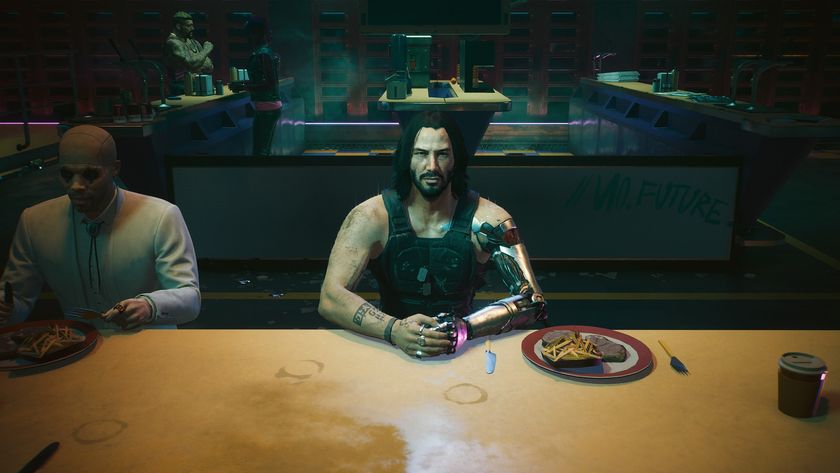Jupiter's Legacy: The Netflix show about the next generation of superheroes
We speak to co-creator Mark Millar and the cast of Netflix's new superhero show, Jupiter's Legacy
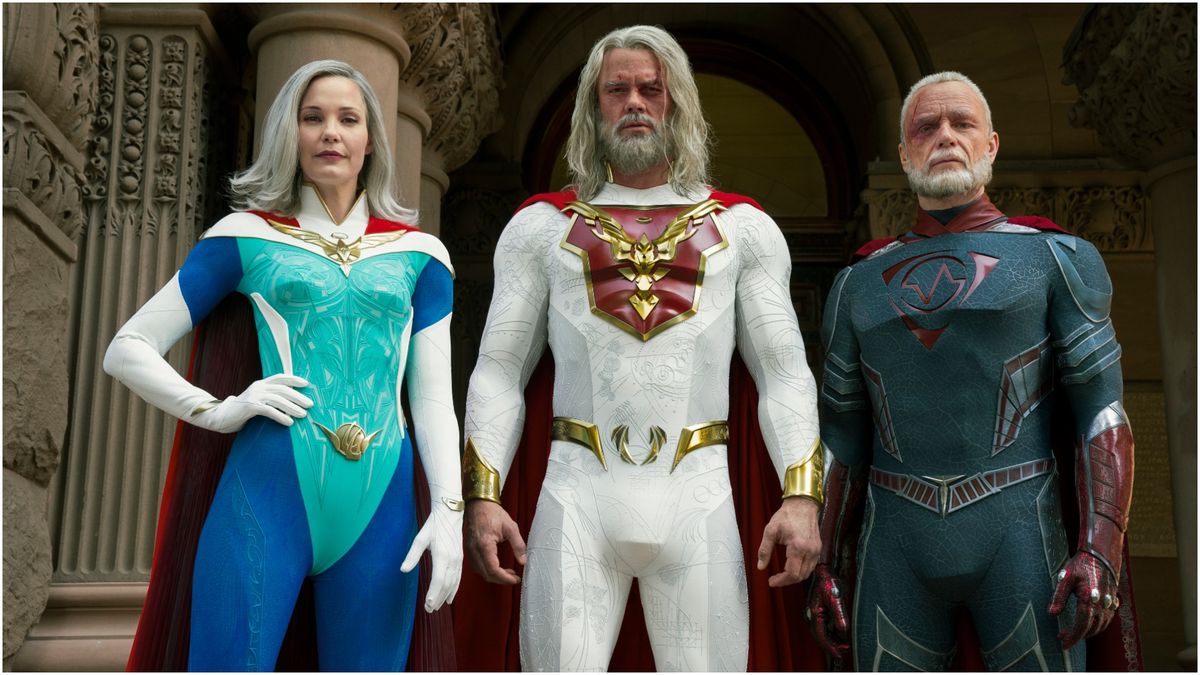
"Everybody always says to me, 'What will this show bring that other superhero things haven't done before?'" Mark Millar says while discussing Jupiter's Legacy, Netflix's new show based on the author's comic book series of the same name. "I think the number one thing is the ethics of superheroes themselves. Once they start falling out with each other, it suddenly moves beyond superhero versus supervillain who's robbing a bank, which can get a little repetitive. So to actually take it to the next level, for me, is so exciting."
The show and comic book (drawn by Frank Quitely) centers on the formation of superhero group the Union, and how the next generation of heroes copes with trying to live up to their sky-high standards. Sheldon Sampson (Josh Duhamel), AKA The Utopian, leads the team, and he expects one of his two children, Brandon (Andrew Horton) – alias Paragon – or Chloe (Elena Kampouris), an addict who wants nothing to do with the whole hero lifestyle, to someday take his place.
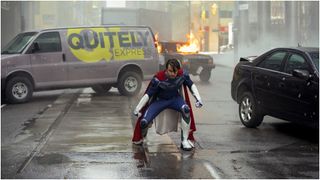
"It's everything to him," Horton says. "Brandon's whole existence is to become The Utopian... The legacy that Utopian has laid down is of such a high caliber and is so unattainable that whatever Brandon does, he can't seem to match those expectations. So in a certain sense, it's a flawed kind of mission for him because he wants so desperately to reach that level. But in The Utopian's eyes, in Sheldon's eyes, he isn't ready to do that, and he's not sure that he ever will. So it's tainted for Brandon, because no matter what he does, he can never live up to the legacy that's come before."
Superheroes are abundant in the world of Jupiter's Legacy. However, while they all work together under The Utopian's moral Code, the excitement comes when the relationships between these supes start to break down. This plays out over multiple timelines, including flashbacks to the '20s and '30s when the Union – formed of The Utopian, his eventual wife Grace, AKA Lady Liberty (Leslie Bibb), his brother Walter, AKA Brainwave (Ben Daniels), the Flare, AKA Fitz Small (Mike Wade), Skyfox, AKA George Hutchence (Matt Lanter) and Blue Bolt, AKA Richard Conrad (David Julian Hirsh) – gain their powers. In the present, we meet the next generation of heroes, including The Utopian's children, all while a mysterious plot involving a supervillain named Blackstar emerges and threatens to tear the already fractured family apart. Things occasionally get confusing as we whiz back and forth between time periods, but the core of the show remains the relationship between The Utopian and his family.
"Sheldon Sampson can spot a dime on the face of the moon, but he has no clue how to speak to his 20 year old daughter," The Utopian himself, Duhamel, says. "He doesn't know how to get through to his son. He feels like he knows he's being too hard on his son, but he also knows that he has to be. And this stuff is real. Like, how do you communicate with your family?"
Before he even gained his powers, there were other tensions in the family: between Sheldon and his brother, Walter, played by Daniels. And those issues arose from their own relationship with their father. "I was really into exploring the idea of what it's like to have Elvis Presley as your brother, or James Dean as your brother – anyone who's like a zillion times cooler than you are and how that impacts on you," Daniels says.
"We see how it impacts on him over the 100 years. I think it's not just Sheldon, though. Walter is like a fish out of water in that world of the 1900s. He lives in a very alpha male environment with his brother, with his dad, with George, and he just doesn't fit in really. So he feels a lot. He's a highly sensitive person. That relationship, or the fuel behind that relationship, or those three relationships tick over in him, and gestate and become something quite toxic a hundred years later."
Sign up for the Total Film Newsletter
Bringing all the latest movie news, features, and reviews to your inbox
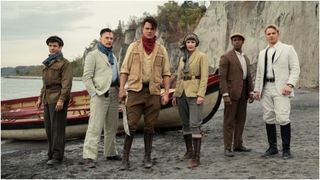
The George that Daniels refers to later becomes Skyfox, another member of the Union who, in the past, was Sheldon's closest friend but had an adversarial relationship with Walter. In the present, George betrays the Union and becomes a supervillain, though the reason is unclear. Matt Lanter talks more about his characters' apparent turn, but won’t give too much away – much like George's shadowy presence in the series. "I think when the whole world's against you, he just would rather go into hiding than try to fight it, but we'll see," he says. "Again, that's really more of a down the road thing."
While the complexities of the familial relationships are a huge part of the show, equal weight is given to an ethical dilemma brought about by the unyielding Utopian's inflexible Code. For Sheldon, it's simple: superheroes do not govern, and they do not kill.
"Sheldon believes that no matter what, even if they're trying to kill him, you do not take another life, and I guess he is extremely rigid in his beliefs," Duhamel explains. "Part of the reason why he's in therapy right now is because I think he knows that he needs to start listening, and possibly be a little bit more flexible. But he feels that if we start changing this Code, it's a slippery slope, and then it becomes a big bloodbath. So he believes very strongly in 'this is what we do. We don't change, this is it.'"
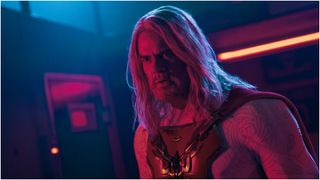
Co-creator Millar – comic book royalty, having previously created the likes of Kick-Ass and written famous storylines for Marvel and DC – further explains the ethical considerations the show grapples with, which come into sharp focus after a dramatic moment in the first episode. "Superheroes have been around 83 years," he says, "and they have a pretty solid set of principles that all superheroes kind of follow, roughly. So it's quite interesting for somebody to come along and break the cycle. So it's like, 'okay, we've killed somebody, where do we go from here?' And the next big ethical dilemma is, if you have the power to move mountains, if you can change the world, is it unethical not to change the world?
"So that's what the superheroes start saying to each other, especially the younger millennial heroes, they're like, 'We're not crazy about the way you guys have been running the show. Is it wrong, that we just stand back and let people starve in some parts of the world, or tortured in concentration camps, or there's a climate emergency and we're doing nothing about it?' So that suddenly becomes really interesting. But then there's also an equally strong argument from the parents, which is, hang on a minute, it's not our place to come in and tell people what to do, just because we're strong."
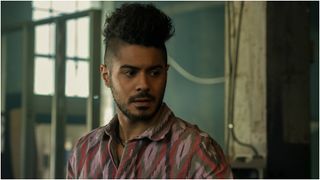
So, a family drama that asks big ethical questions – Jupiter's Legacy sounds unlike most superhero series. Yet, in a world where the MCU and DCEU are both coming to the small screen, and Amazon's already pumping out shows like Invincible and The Boys (and Netflix even has The Umbrella Academy), do we really need another superhero property on our screens?
"I think there will always be room for superhero projects, because I think that superhero projects are stories about belief in things that are greater than ourselves, whether it be like the Code for The Utopian, or hope like Superman," Ian Quinlan, who plays not-quite-hero-not-quite-villain Hutch, explains. "But I think what makes this superhero show different from others is that I find it to be actually more of a drama than it is a superhero show, ironically. It's more about this family, and the struggles that they go through and the stresses that their calling of being heroes takes on them as individuals and then as a group, and how it puts strain on all of them in our society, or puts us in combatants with our society. So I'm really excited to see these internal monologues, to really look at this sort of superhero type figure of The Utopian and really see how he wrestles every single day just being who he is, as well as being a father."
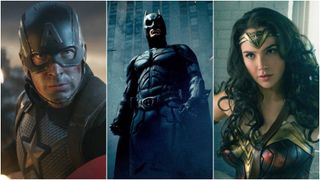
What also makes Jupiter's Legacy intriguing for comic book fans is that, even if you have read the source material, you cannot assume anything. Things happen differently in the new Netflix show. "I think I can say with confidence that we maintain the DNA and the integrity of the story, what made it spark, what made it unique from all the other stuff out there, while also injecting twists and turns and cliffhangers that kind of expound off of the rich stuff in the book itself," Chloe actor Kampouris says. "They take some really cool elements, and then twist it out on its head, and create some twists that even if you've read the comics, you won't see coming, and hopefully, it will get you even more excited… I think it's a fine balance of maintaining the bones of it, and then giving it something fresh and new because it's being translated onto the screen."
A superhero show that's not afraid to tackle some big questions, Jupiter's Legacy is set to be an entertaining, cross-generational journey through a new super-universe.
Jupiter's Legacy arrives May 7 on Netflix. In the meantime, check out the best Netflix shows to stream now.

I'm a Senior Entertainment Writer here at 12DOVE, covering all things film and TV for the site's Total Film and SFX sections. I previously worked on the Disney magazines team at Immediate Media, and also wrote on the CBeebies, MEGA!, and Star Wars Galaxy titles after graduating with a BA in English.
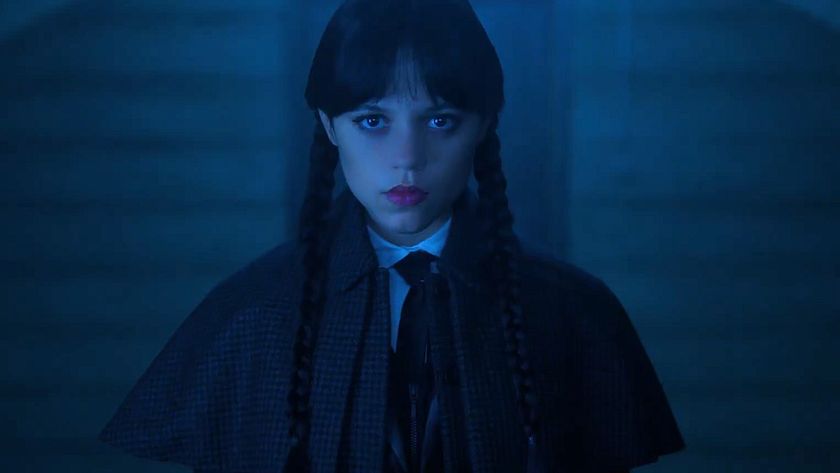
Creepy new look at Wednesday season 2 confirms Tyler's fate, as Jenna Ortega's hero embraces her darker side
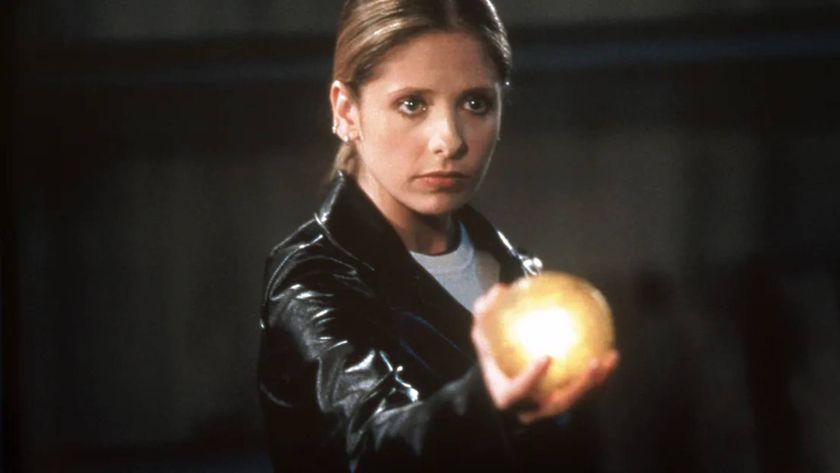
Sarah Michelle Gellar is more open than ever before to a Buffy revival – and the director of one of this year's best horror movies has already staked their claim on it
Most Popular







